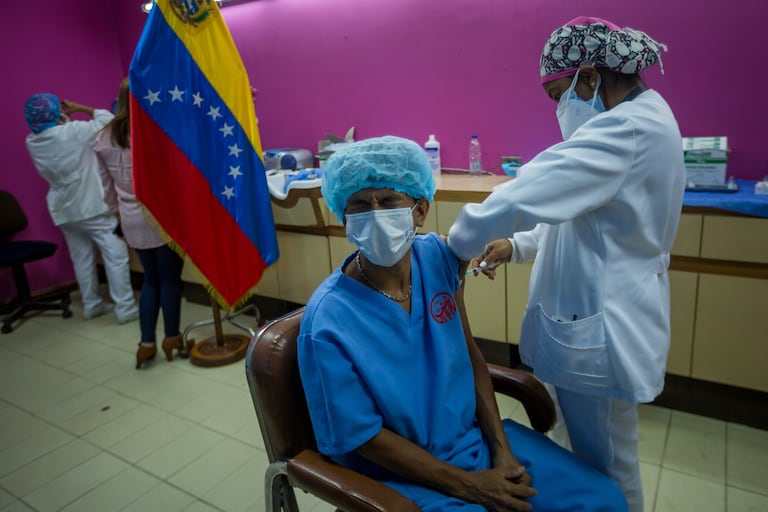Workers of the Domingo Luciani hospital participate in a day of vaccination against covid-19 with doses of the Russian Sputnik V, on March 4, in Caracas.Miguel Gutiérrez / EFE
Venezuela suffers from an accelerated increase in COVID-19 infections.
The country seems on track to once again reach the highest levels of the quarantine era, recorded last August.
Public hospitals and private specialized clinics are at the limit of their capacity.
To contain the situation, the Government of Nicolás Maduro has decreed a sanitary fence over Caracas and the States of Miranda, Vargas and Bolívar, and has again enabled spaces that allow attending a high number of patients, such as El Poliedro de Caracas, the dome for massive concerts and largest exhibitions in the city.
Maduro, who has already been vaccinated as well as almost all government officials, has once again declared Venezuela "in emergency" and established as a priority "developing new hospital capacities."
Official figures recognize 146,000 cases of covid 19 and 1,400 deaths.
The record of some unofficial medical calculations suggests that the number of infected is five times higher.
The government does not have the means to carry out sufficient tests, independent doctors have said.
The average number of daily infections, according to epidemiologist José Félix Oletta, is 2,500 people.
At the head of a precarious public health system ravaged by corruption, the government is working fast to make new hospital beds available.
For the experts consulted by EL PAÍS, the current increase in cases is an unavoidable consequence of the official decision to decree the opening of activities during the Christmas holidays due to the withdrawal of the virus observed until then.
In December, for the first time in several months, the population was able to move without restrictions for leisure or to visit relatives.
Venezuela fears for the arrival of the Brazilian variant of the virus, a more contagious mutation.
"In a month, this variant will be in full transmitting activity in our country and our vaccination capacity will be far from guaranteeing herd immunity," says Rafael Orihuela, medical expert in public health and member of the Institute of Tropical Medicine of the Central University from Venezuela.
Data from the Ministry of Science and Technology report 56 cases of this variant so far, almost all concentrated in the States where the epidemiological fence is decreed.
“We are entering the second wave of infections.
Clearly, the capacity of the healthcare centers is about to be exceeded, we have many patients looking for hospital beds.
We would like to be able to attend to all of them, but it is impossible ”, says María Eugenia Landaeta, head of the Department of Infectious Diseases at the University Hospital of Caracas.
“The oxygen concentrators and cylinders, as well as the anticoagulants, are out of stock in Caracas at the moment.
The health centers have taken over too quickly ”, adds the epidemiologist and former Minister of Health, José Félix Oletta.
After spending three months under quarantine, as of July last year, Venezuelans organized their lives according to the “7x7” system decreed by Maduro: one week with trade and restricted mobility followed by another with normal activities.
The current explosion of infections, Oletta observes, is related to the general relaxation in the rules of recent weeks.
Except for the routes to Margarita Island during carnivals, in Venezuela most of the internal commercial flights are still banned.
Maduro has announced a massive phase of vaccinations for the month of April.
His ministers have declared that they expect to have 70% of the population vaccinated by the end of 2021, a goal that many experts question.
Some 700,000 Russian and Chinese vaccines have entered the country and are being applied with opaque criteria and with a clear political filter.
Oletta affirms that 0.5% of the population has been covered with this.
The slowness in the vaccination process, Rafael Orihuela recalls, would leave the ground free for virus mutations.
Caracas vetoes AstraZeneca
The possibility of curbing the epidemic in Venezuela has been complicated after the official veto of the AstraZeneca vaccine.
The South American country follows in the footsteps of European countries such as Denmark, France and Spain that have temporarily suspended the vaccine for 11 cases of cerebral venous thrombosis after administering more than 17 million inoculations.
The vice president of Venezuela, Delcy Rodríguez, stated: "Venezuela will not give permission for the AstraZeneca vaccine to be used in our immunization due to the situations that have arisen."
At the beginning of February, the Pan American Health Organization (PAHO) indicated that it already had reserved for Venezuela between 1.4 and 2.4 million doses of the vaccine developed by Oxford and AstraZéneca, through the Covax mechanism.
PAHO has access to other manufacturers with which it could deliver the 12 million doses that Venezuela could have access to.
A political agreement was necessary between the Government of Nicolás Maduro and the team of the opposition Juan Guaidó, which still controls the funds frozen abroad with which Venezuela could pay for the products.
A total of 18 million dollars would ensure the arrival of more vaccines, which is expected to be in May.
Three weeks ago it was agreed to create a Technical Table to draw up the vaccination plan under the control of UNICEF and PAHO.
The last week the teachers were vaccinated.
Venezuela needs 40 million doses to achieve immunity for 70% of its population.
Subscribe here to the EL PAÍS América newsletter
and receive all the informative keys of the present time of the region.

